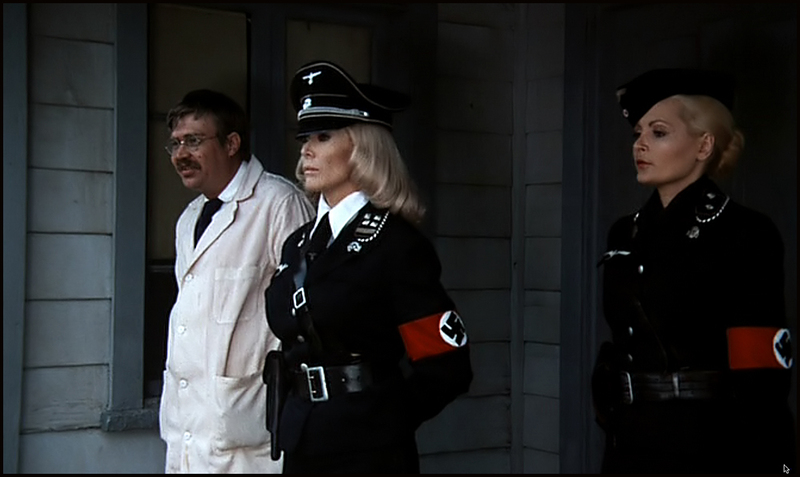
Still Shocking Fifty Years Later
MOVIE REVIEW
Ilsa She Wolf of the SS
–
Genre: Erotica, Exploitation, Cult
Year Released: 1975, Kino Lorber 4K 2025
Runtime: 1h 36m
Director(s): Don Edmonds
Writer(s): Jonah Royston, John C. W. Saxton
Cast: Dyanne Thorne, Gregory Knoph, Tony Mumolo, Maria Marx, Nicolle Riddell, George “Buck” Flower, Rodina Keeler, Sandy Richman, Uschi Digard, Colleen Brennan
Where to Watch: available October 14, 2025, pre-order your copy here: www.kinolorber.com or www.amazon.com
RAVING REVIEW: There’s a reason ILSA, SHE WOLF OF THE SS continues to haunt conversations about exploitation and censorship nearly fifty years after its release. It’s not a film that hides behind metaphor or restraint—it’s raw, offensive, and proudly coarse. What makes Kino Lorber’s new 4K UHD restoration noteworthy isn’t that it redeems the film, but that it confronts it. This is one of the most notorious examples of 70s grindhouse excess—filmmaking that dared viewers to recoil and look closer.
Directed by Don Edmonds and starring Dyanne Thorne in her most infamous role, ILSA walks a thin and uncomfortable line between eroticism and horror. It’s a “Nazisploitation” picture—one of the most vulgar and controversial subgenres of the decade—depicting a sadistic warden at a Nazi concentration camp who uses prisoners for medical “experiments” and sexual torture. It’s a film that was never meant to be respectable. It was designed to shock, to test the limits of what could be projected on a screen, and to capitalize on taboo fascination with power and perversion.
Thorne’s performance as Ilsa is disturbingly commanding. She embodies the archetype of authoritarian cruelty with a mixture of exaggeration and detachment, turning her character into a living symbol of domination and depravity. Her performance is both ridiculous and terrifying, simultaneously cartoonish and repulsive. She plays the role as if she’s fully aware of its absurdity, yet she never flinches from the ugliness the part demands.
The film’s production history is as bizarre as its content. Shot on the abandoned set of the TV series Hogan’s Heroes, ILSA’s fictional concentration camp existed only because it was cheaper to destroy it than to dismantle it. Edmonds and his crew, many of whom came from mainstream Hollywood backgrounds, worked under pseudonyms to protect their reputations. The result is an exploitation film with surprisingly competent craftsmanship—an irony not lost on film historians. The camera work is professional, the editing is tight, and the effects (by Joe Blasco) are effectively unsettling.
It’s impossible to discuss ILSA without addressing its moral abyss. The film turns the Holocaust into a setting for sex and violence, a decision that remains indefensible no matter how self-aware the tone may be. For some, it’s a commentary on the commodification of suffering; for others, it’s nothing but exploitation of the worst kind. But within the landscape of exploitation cinema, ILSA holds a specific, infamous place—it exposed just how far filmmakers would go when free from mainstream constraints, and how audiences of the time, still reeling from the trauma of Vietnam and the collapse of authority, craved cinematic extremity.
What keeps ILSA from total collapse under its own depravity is its unflinching honesty about what it is. It never pretends to be an anti-war statement or a political metaphor. It’s pure provocation—ugly, lurid, and tasteless. Yet, that clarity of purpose gives it a strange kind of integrity. In a genre built on hypocrisy and half-hearted excuses, Edmonds makes no apologies.
The new restoration treats the material with both historical respect and contextual awareness. By restoring the original poster art and including commentaries by film historians Kat Ellinger and Evgueni Mlodik, the release invites viewers to reconsider—not to excuse—the film’s legacy. Hearing the reflections of Dyanne Thorne, Don Edmonds, and producer David F. Friedman reveals how exploitation cinema was both a cynical business and an oddly liberating creative outlet. These people weren’t crafting art in the traditional sense; they were testing how far they could go before someone stopped them.
The image clarity brings new life to cinematography that had long been buried in grainy prints and murky VHS transfers. Colors pop with vibrancy, and the sound mix—now in restored mono—retains the rawness that defines grindhouse cinema. Ironically, the better the film looks, the worse it feels. The brutality is no longer softened by poor image quality, making it even harder to watch.
The supplementary materials included with Kino’s release are equally essential. The new commentary tracks, especially those by Ellinger and Mlodik, dissect the film’s place within feminist and cultural critique. They don’t excuse its misogyny or distorted sexuality but contextualize it within a broader cinematic conversation—how exploitation films of the ’70s mirrored, twisted, and commodified cultural anxieties about gender and violence.
Viewed today, ILSA, SHE WOLF OF THE SS remains a contradiction. It’s revolting yet historically significant, absurd yet haunting. It represents both the worst instincts of filmmaking and the strange power of cinema to reflect humanity’s darkest curiosities. It’s a film that deserves to be studied. As modern audiences revisit it through this restoration, it stands less as a work of entertainment and more as a cultural fossil—a cautionary reminder of where shock for shock’s sake can lead.
For those exploring exploitation cinema, ILSA is a grim milestone. It’s not for casual viewers or those expecting grindhouse “fun;” it’s a psychological endurance test that remains as potent now as when it premiered. It’s the kind of movie that leaves you questioning not just the filmmaker’s intentions but your own decision to keep watching.
Please visit https://linktr.ee/overlyhonestr for more reviews.
You can follow me on Letterboxd, Instagram, Twitter, and YouTube. My social media accounts can also be found on most platforms by searching for 'Overly Honest Reviews'.
I’m always happy to hear from my readers; please don't hesitate to say hello or send me any questions about movies.
[photo courtesy of KINO CULT, KINO LORBER]
DISCLAIMER:
At Overly Honest Movie Reviews, we value honesty and transparency. Occasionally, we receive complimentary items for review, including DVDs, Blu-rays, CDs, Vinyl Records, Books, and more. We assure you that these arrangements do not influence our reviews, as we are committed to providing unbiased and sincere evaluations. We aim to help you make informed entertainment choices regardless of our relationship with distributors or producers.
Amazon Affiliate Links:
Additionally, this site contains Amazon affiliate links. If you purchase through these links, we may receive a commission. This affiliate arrangement does not affect our commitment to honest reviews and helps support our site. We appreciate your trust and support in navigating these links.



Average Rating